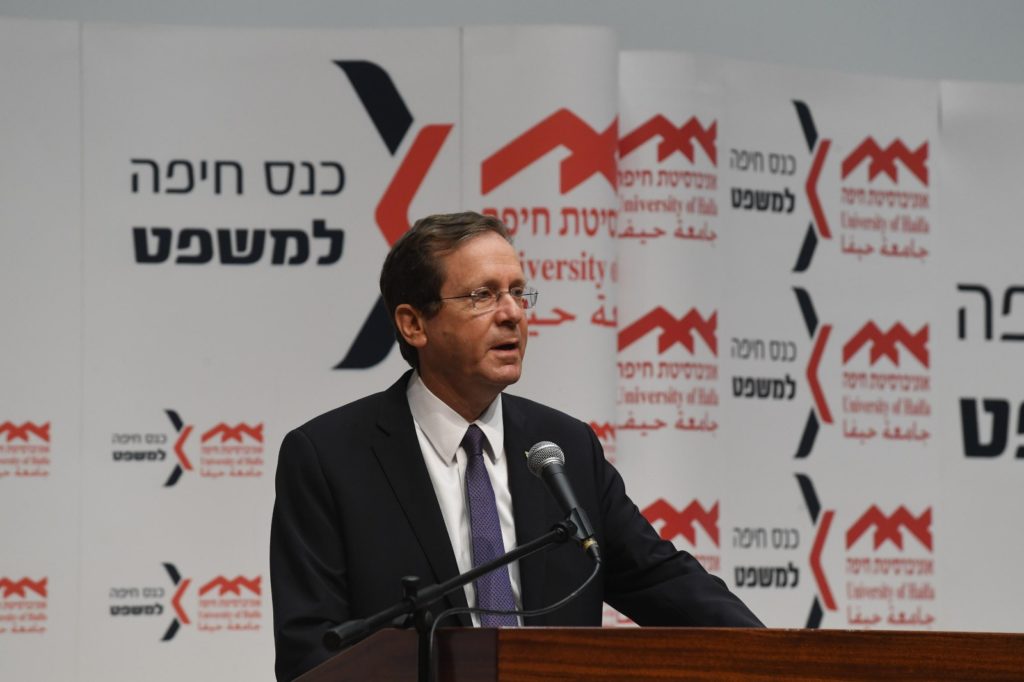
Israeli President Isaac Herzog is done with slow-moving diplomacy when it comes to Iran’s nuclear program—and he thinks his country’s allies should be too. In an unusually strong and public call to action in an editorial in the United Kingdom’s The Sunday Telegraph, Herzog effectively called the renewed nuclear negotiations between Iran and the major world powers “wasting time,” just one day after the United States reminded everyone there are additional options in dealing with Iran if talks fail.
“Iran does not want dialogue. It is exploiting the world’s willingness to negotiate to buy time,” wrote Herzog in excerpts published by Israel from the editorial timed to coincide with his visit to the UK. “Israel cannot allow the fundamentalists of Tehran to acquire a nuclear bomb. The moderate nations of the Middle East need their allies, including Britain, to engage them in an urgent dialogue on how to stop Iran instead of wasting time on its games.”
Israel has long expressed concerns about the nuclear negotiations with Iran, which it sees as being too weak and permitting Tehran to simply delay developing a nuclear weapon rather than stopping them. After months of refusing to talk, Iran is poised to resume negotiations later this month with world powers. This comes against the backdrop of Iran making troubling progress towards weapon’s-grade nuclear fuel.
Herzog’s strong words stand out even more given the role of President in Israel, which is more of a ceremonial position that acts as a representative for the country. Furthermore, Herzog’s position wasn’t limited to Sunday’s editorial.
Prior to departing for the UK, he promised to be forthright on how Britain and others should respond to Iran. “I shall make clear that Israel cannot allow Iran to acquire nuclear weapons capability and it expects its allies to be tough and assertive toward the Iranians, including in their dialogue with them,” said Herzog in comments published by Israel’s press office. “Israel makes this position clear to all its friends and of course makes clear that it reserves all options to defend itself.”
Israel isn’t the only country thinking about its options vis-à-vis Iran. US Secretary of Defense Lloyd Austin—in a slightly watered-down version of the “all options on the table” expression meant to threaten military action—warned on Saturday that negotiations aren’t the only way the US can address Iran’s nuclear crisis.
“The United States remains committed to preventing Iran from gaining a nuclear weapon. And we remain committed to a diplomatic outcome of the nuclear issue,” said Austin in a speech published on the Defense Department’s website. “But if Iran isn’t willing to engage seriously, then we will look at all the options necessary to keep the United States secure.”
Austin’s comments, delivered in a speech in Middle Eastern ally Bahrain, said the US and its partners would be returning to nuclear talks with Iran in Vienna this week in “in good faith,” but expressed concerns as well.
“Iran’s actions in recent months have not been encouraging—especially because of the expansion of their nuclear program,” said Austin, who reiterated US Secretary of State Blinken’s warning that Iran’s nuclear activities are “bringing us closer to the point” at which even a renewed nuclear deal “won’t recapture its benefits” because of Iran’s nuclear progress.
“But if Iran comes back with constructive positions, we still think we can quickly resolve our lingering differences to make a mutual return” to the nuclear accord, said Austin.
Ultimately, Austin sought to reassure Bahrain and other American allies about where the US stands on Iran, even as the Biden Administration seeks to resume a nuclear arrangement with Iran three years after previous President Donald Trump scuttled the prior deal due to concerns about its weaknesses.
“Iran should have no illusions that it can undermine our strong relationships in this region,” said Austin. “And we will defend ourselves, and we will defend our friends, and we will defend our interests.”
While the US is touting its support for its allies in facing Iran, Israel is waiting to see if their expectations of how an ally should treat Iran will be met—and making those expectations clear.
(By Joshua Spurlock, www.themideastupdate.com, November 21, 2021)
